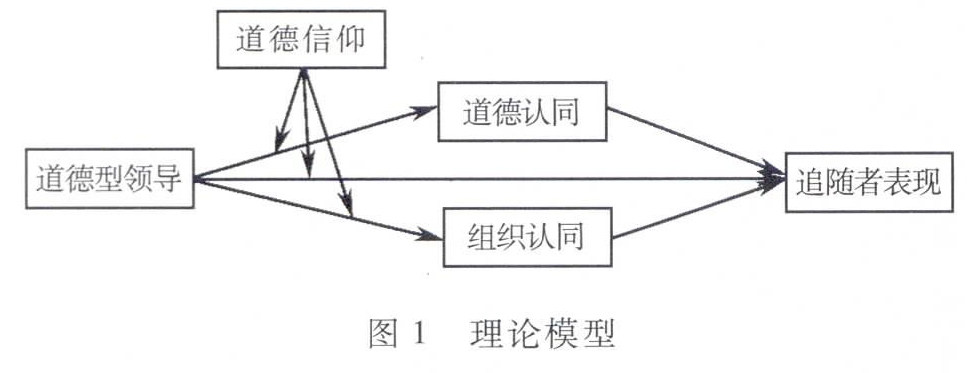
打开文本图片集
摘要:道德型领导是领导学领域近年来新兴的研究热点。本文基于社会认同理论和内隐理论,通过引入道德认同、组织认同双重中介变量,构建了以道德信仰作为调节变量的被中介的调节效应模型。在SPSS和AMOS环境下运用多重线性层次回归、相关分析和验证性因子分析等方法对模型进行统计检验,探究了道德信仰对道德型领导与追随者认同、表现之间作用路径的影响。结果表明,道德认同与组织认同在道德型领导与追随者表现之间分别起了完全中介与部分中介的作用,而道德信仰不仅在道德型领导与追随者双重认同之间都具有调节效应,而且还显著强化了道德型领导与追随者认同、表现之间的正向关系。该结论为如何提高道德型领导的有效性及追随者认同表现提供了新的管理启示。
关键词:道德型领导;道德认同;组织认同;道德信仰;追随者表现
中图分类号:F272.92文献标识码:A文章编号:10035192(2017)02000108
doi:10.11847/fj.36.2.1
Moral Leadership and Follower:A Mediatedmoderation Model of Moral Belief
WU Mengying1,2, PENG Zhenglong1, HE Peixu1
(1.School of Economics and Management, Tongji University, Shanghai 200092, China; 2.KEDGE Business School, Bordeaux 33405, France)
Abstract:Moral leadership is a new research hotspot in the field of leadership in recent years. Based on social identity theory and implicit theories, this paper constructs a mediatedmoderation model that introduces doubledimensional mediations with moral identity and organizational identity and uses moral belief as the moderator, and then multiple linear hierarchical regression, correlation analysis, confirmatory factor analysis are statistically tested in SPSS and AMOS environment. Moreover, the effects about different followers’ moral belief in influencing mechanism among moral leadership, identity and performance of followers are explored and validated. The results indicate that: moral identity fully mediated the relationship between moral leadership and followers’ performance, while organizational identity partially mediated the relationship of that. The moral belief not only has the moderating effect between the dual identity in the moral leadership and followers, but also significantly strengthens the positive relationship between moral leadership and followers’ performance. It is found from the results that this research can provide enlightenment to improve the effectiveness of moral leadership and recognize performance of followers.
Key words:moral leadership; moral identity; organizational identity; moral belief; follower performance
1引言
美國民权运动领袖Martin Luther King[1]曾经说过:“我更崇尚道德而不是权力,因为它不仅正确而且美好”。现如今道德型领导已不再是理想主义者们的政治宣言,而是国际社会与普通民众的主要利益诉求。最近10年来,商业道德丑闻的频频曝光已引起了公众与学术界的广泛关注,在这一系列貌似道德沦丧的背后存在着一个值得我们深思的问题:领导力应该何去何从? Piccolo等[2]曾提出,道德行为是领导信誉与潜在影响组织内所有层次追随者的关键因素,道德型领导也对组织成就有着巨大影响力。然而,随着社会对道德诉求的不断增加,全球化商业背景下日益复杂交错的任务(尤其是非结构化与开放式任务)使得追随者们的工作早已超出了职位所描述的工作范围与组织公民行为部分[3],领导学研究也日渐重视道德型领导对追随者工作行为的影响,道德型领导对追随者自愿完成这些任务的影响似乎越发明显。因此,深入探讨道德型领导与追随者表现的影响关系具有十分重要的现实意义。



